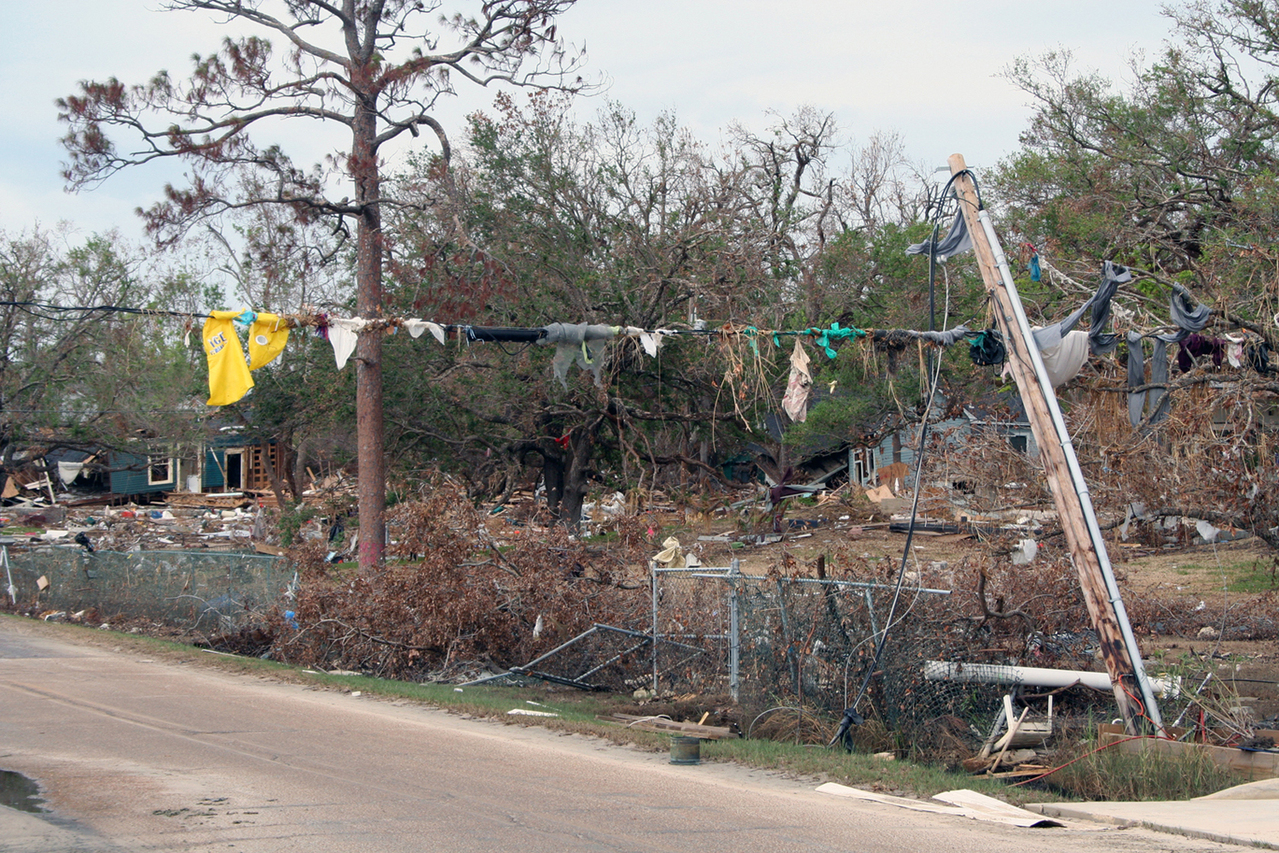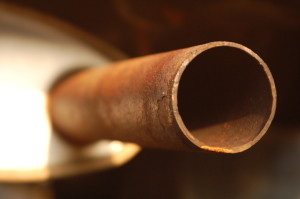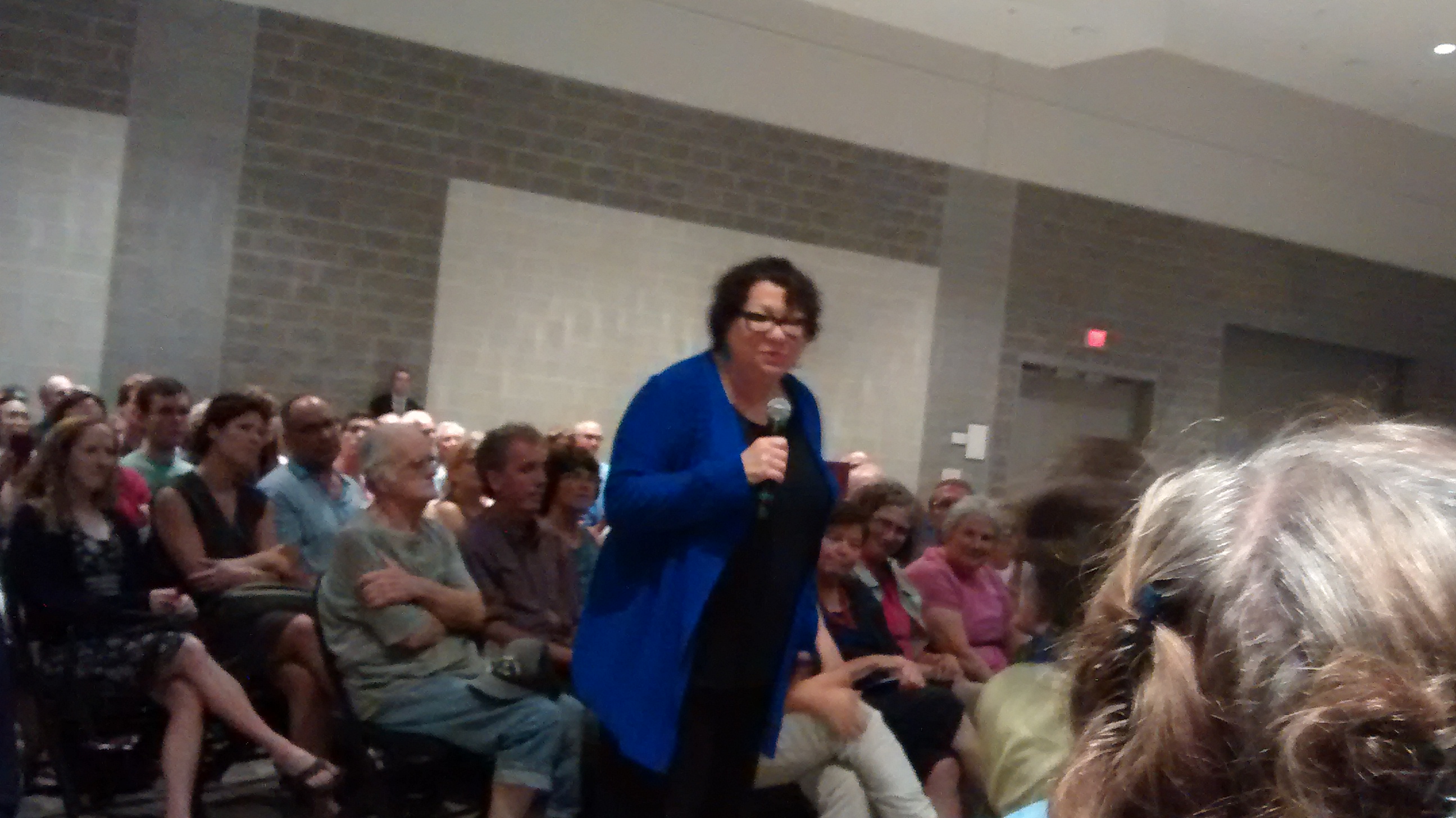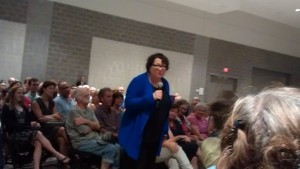Climate Change is Our Opportunity to Remake Society, Says Naomi Klein
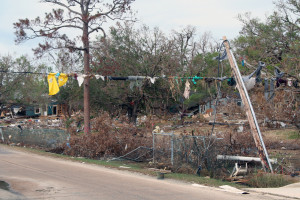
It’s not often you hear a self-professed liberal Jewish feminist open her talk with ten minutes praising the Pope. But that’s how Naomi Klein, author of This Changes Everything, The Shock Doctrine, and several other groundbreaking books, began her talk at Mount Holyoke College last night. While acknowledging a litany of areas where she and Francis have profound disagreements—among them same-sex marriage and a woman’s right to control her own body—she thanked him publicly for his attention to the planet in peril and its dispossessed people, saying he was a great example of what environmental leadership looks like right now.
And for Klein, those two areas—helping the planet and replacing poverty with abundance—are forever braided together. “Climate change is an accelerant to all the other issues going wrong…It’s not about saying climate change is so big that it trumps everything else. All are equally urgent, and we don’t win by pitting these issues against each other.” We win, she says, by joining forces to demand holistic approaches that simultaneously solve climate heating, create jobs and economic opportunity, and remediate ism-based oppression—by “connecting climate change with a broken economic model”—a concept she calls “intersectionality.”
(This is a message particularly dear to my own heart, and thoroughly integrated into my forthcoming 10th book, Guerrilla Marketing to Heal the World as well as my own talk, “‘Impossible’ is a Dare.”)
The impacts of climate change, she notes, often fall most heavily among the very poor countries, and the very poor residents of rich countries. Oil refineries, coal plants, and high asthma rates tend to be found in low-income communities, often with high concentrations of people of color. Rising floodwaters will inundate poor, tiny island nations first. “It’s not just about things getting hotter, but about things getting meaner. More militarized, more racist,” as we see in the response of countries like Hungary to the Syrian refugee crisis. Which she sees as climate-related, noting that the Syrian civl war followed the worst drought in Syria’s history. Climate change, she says, is also a women’s and a feminist issue; the impacts hit women disproportionately as well.
So her challenge to climate activists is to turn “disaster apartheid” (e.g., the detestable official response to Hurricane Katrina) into “energy democracy.” And that includes making sure that the communities hit hardest are first in line for improvements that meet their needs.
Hurricane Katrina, which inspired Klein to write The Shock Doctrine and begin her climate study that led to This Changes Everything, was a perfect storm combining “heavy weather and a weak and neglected public sphere.” She points out that by the time Katrina made landfall, it had been downgraded from a Category 5 hurricane to a mere tropical storm. The levees should have withstood the onslaught, if they hadn’t been allowed to fall into disrepair.
While the world looked on with horror as “FEMA couldn’t find New Orleans,” and “prisoners were abandoned, locked in their cells as the waters were rising,” evacuees were given one-way tickets out, and the elites seized an opportunity to remake the city as a wealthier place, with 100,000 fewer poor blacks, even tearing down public housing projects undamaged by the storm, to replace them with high-end condominiums.
Quoting Black Lives Matter leader Alicia Garza, Klein says it’s time to “‘make new mistakes’…we can’t demand perfection but we can demand evolution.”
Examples of the old mistakes we shouldn’t keep making:
- “Projecting messianic fantasies onto politicians” and becoming disappointed when they fail to save us
- Believing we can solve all our problems with market forces (she cites the recent Volkswagen fuel emissions tampering scandal as an example of why that doesn’t work)—or with technological fixes, which include not only wonderful new green energy systems but also environmentally catastrophic technologies like fracking (“the oil companies have figured out how to screw us sideways”), tar-sands oil, and massive pipelines such as the Keystone XL
- “Building a movement entirely of upper-middle-class white people and wondering why people of color don’t join”
- “Tearing other people to shreds” in bouts of anger disguised as political purity
- Thinking that any one of us can do it all ourselves
Noting that fossil fuel companies will work extremely hard to protect their enormous profits and will try to win the public by pointing out the lifestyles of luxury fossil fuels have allowed us, Klein says we won’t win by trying to educate fossil-fuel billionaires like the Koch brothers. Furthermore, “we cannot look at this without looking at who burned what, when. Fossil fuels have allowed us to live the fantasy of a life apart from nature. But the response from the earth, though slow in coming, says there’s no such thing as a one-way relationship, and you were never the boss! We could see this as a cosmic demotion—or as a gift.”
But we do have many victories to celebrate, including Shell’s decision this week in the face of strong opposition from environmentalists to withdraw from arctic drilling…China’s major reduction in coal development and initiation of carbon cap-and-trade—due to public pressure even in that repressive society—when only a few years ago a new coal plant was opening every week…the 400,000 new jobs Germany has created in shifting 30 percent of its energy from fossil and nuclear to solar and wind (to name a few). “As I talk to people, the biggest problem is that they think they can’t win. But we are winning, as part of a global movement.
And just as the shock of the Great Depression economic collapse created space for New Deal social reforms, so the climate catastrophe, coupled with the current collapse of fossil fuel prices, with the price of a barrel of oil plummeting from $100 to $50 in three months, could catalyze transformation: “integrated holistic solutions and a road map. There’s a progressive tradition of using these shocks to build….a moment where we can do things that weren’t possible before. We can shut down bad projects and bad policy. We can win a moratorium on all arctic drilling. It’s easier to bring in a bold progressive carbon tax…the political goal has to be a polluter-pays principle…the mostr sustainable route is weaving together the yes and the no.” She delighted in recent progressive electoral victories in Alberta (long controlled by tar-sands-loving right-wingers) and in the UK, where the Bernie Sanders-like Jeremy Corbyn has just become head of the Labour Party. Also in Alberta, she took hope from a conference that brought together union miners from the tar sands, environmentalists, and many other sectors and emerged with a progressive manifesto.
Before a brief Q&A, she closed her formal presentation with a clarion call to optimism AND action:
We need to move from a society based on extraction to one based on caring, including a guaranteed annual income. Caregiving jobs are climate change jobs. We must expand the caring economy and contract the careless economy. 2016 is a leap year; we add a human-created day in deference to the earth’s rotation. That’s an increased opportunity to build a much better world. We will be told it’s impractical. But $2.6 trillion has been divested from fossil fuel.
Quoting a woman leader in Nauru, a tiny Pacific Island being lost to climate change after a catastrophic history of exploitation by First World economies (Klein chronicles the sad tale in This Changes Everything), she continued,
“If politics are immovable, let’s change the politics.” Now is not the time for small steps. Now is the time to leap!

